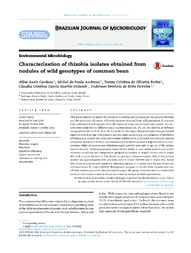Characterization of rhizobia isolates obtained from nodules of wild genotypes of common bean.
Characterization of rhizobia isolates obtained from nodules of wild genotypes of common bean.
Author(s): CARDOSO, A. A.; ANDRAUS, M. de P.; BORBA, T. C. de O.; MARTIN-DIDONET, C. C. G.; FERREIRA, E. P. de B.
Summary: This study aimed to evaluate the tolerance to salinity and temperature, the genetic diversityand the symbiotic efficiency of rhizobia isolates obtained from wild genotypes of commonbean cultivated in soil samples from the States of Goiás, Minas Gerais and Paraná. The iso-lates were subjected to different NaCl concentrations (0%, 1%, 2%, 4% and 6%) at differenttemperatures (28◦C, 33◦C, 38◦C, 43◦C and 48◦C). Genotypic characterization was performedbased on BOX-PCR, REP-PCR markers and 16S rRNA sequencing. An evaluation of symbioticefficiency was carried out under greenhouse conditions in autoclaved Leonard jars. Among98 isolates about 45% of them and Rhizobium freirei PRF81 showed a high tolerance to tem-perature, while 24 isolates and Rhizobium tropici CIAT899 were able to use all of the carbonsources studied. Clustering analysis based on the ability to use carbon sources and on thetolerance to salinity and temperature grouped 49 isolates, R. tropici CIAT899 and R. tropiciH12 with a similarity level of 76%. Based on genotypic characterization, 65% of the isolatesshowed an approximately 66% similarity with R. tropici CIAT899 and R. tropici H12. About20% of the isolates showed symbiotic efficiency similar to or better than the best Rhizobiumreference strain (R. tropici CIAT899). Phylogenetic analysis of the 16S rRNA revealed that twoefficient isolates (ALSG5A1 and JPrG6A8) belong to the group of strains used as commercialinoculant for common bean in Brazil and must be assayed in field experiments.
Publication year: 2017
Types of publication: Journal article
Unit: Embrapa Rice & Beans
Observation
Some of Embrapa's publications are published as ePub files. To read them, use or download one of the following free software options to your computer or mobile device. Android: Google Play Books; IOS: iBooks; Windows and Linux: Calibre.
Access other publications
Access the Agricultural Research Database (BDPA) to consult Embrapa's full library collection and records.
Visit Embrapa Bookstore to purchase books and other publications sold by Embrapa.

